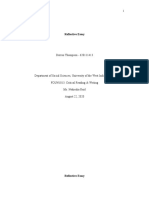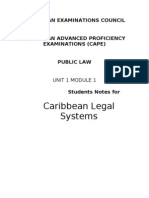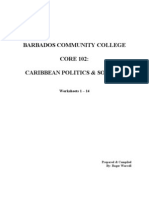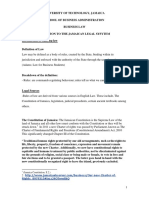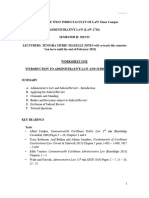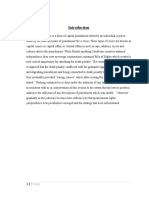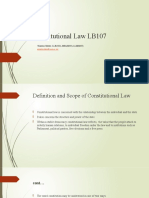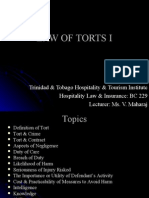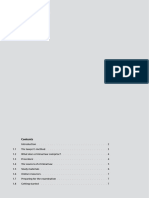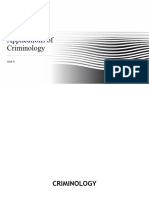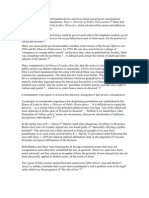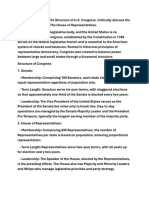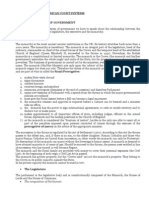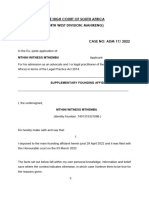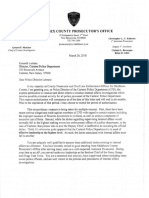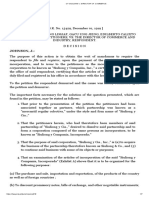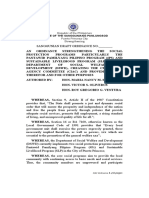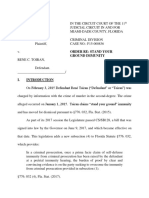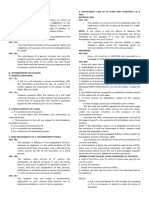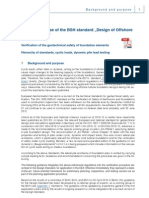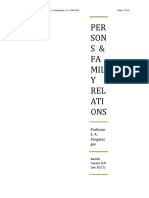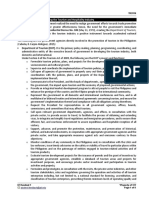#06 - Westminster Model
#06 - Westminster Model
Uploaded by
Anika TaylorCopyright:
Available Formats
#06 - Westminster Model
#06 - Westminster Model
Uploaded by
Anika TaylorCopyright
Available Formats
Share this document
Did you find this document useful?
Is this content inappropriate?
Copyright:
Available Formats
#06 - Westminster Model
#06 - Westminster Model
Uploaded by
Anika TaylorCopyright:
Available Formats
CARIBBEAN POLITICS and SOCIETY The Westminster\Whitehall Model in the Caribbean The Westminster model is the system of practices
and conventions that have formed the basis of the British governmental system. The name is derived from the British parliament that is located at Westminster in London, England. The Westminster model places great emphasis on the role of parliament in the government of a country. In general the Westminster model is a system of government in which the Executive is drawn from and is accountable to the parliament. Westminster System in the Caribbean. The present political system in the English speaking Caribbean has its origins in the Westminster system since it is mainly a result of 19th and 20th centuries British political practices imposed on the territories when they were British colonies. Caribbean independence constitutions were partly borrowed and partly written by British civil servants. Commonwealth Caribbean constitutions have produced a political system that comprises all the main features of the British constitution. However the independence constitutions saw some modifications in their transfer of the model to the West Indies. Due to the many modifications and changes that have been made to the model in its transfer to the Caribbean, it has sometimes been referred to as the Whitehall model of government. Whitehall is the home of the British civil service, which includes the Colonial Office. Outlined below are the characteristics of the pure Westminster Model and the modifications: An Unwritten Constitution (See note on Caribbean Constitutions). Modification. A written constitution whose most important provisions can only be altered by a special procedure. This refers to the entrenched provisions. * All Caribbean constitutions are written constitutions and these are supreme, whereas in Britain, Parliament is supreme. Minority groups are given certain assurances that are not expressly given in the British system, this has been mostly done through constitutionally guaranteed rights. Parliamentary Sovereignty (Supremacy). Parliament comprising the Queen, House of Lords and the House of Commons is recognised as the highest body in the land for making laws. Parliament can pass laws, and amend or repeal legislation on any subject; The power and jurisdiction of parliament is so transcendent and absolute, that it cannot be confined, either for causes or persons, within any bounds . What parliament doth no authority upon earth can undo. Sir Edward Coke on the British constitution o no body outside of parliament is required to agree or not agree before any law is made, except the monarch. o the courts do not have the power of judicial review, i.e. the power to declare Acts of Parliament unconstitutional. No act of the legislature can be called into question in any court of law. o Through an Act of Indemnity, Parliament can legalise illegalities.
Modification. Provision for judicial review making the constitution supreme. The judiciary under the constitution has the sole authority to decide the constitutionality of legislation passed by the legislature (parliament). Judicial review is therefore a means of exercising restraint on the legislature and is a standard practice of democratic countries. Bicameralism. There are two chambers in parliament at least one of which must be elected, the House of Commons (the Lower Chamber) and the House of Lords (the Upper Chamber). Almost all legislative power belongs to the Commons. The only power the House of Lords retain is to delay legislation: money bills for one month and other bills for one year. Membership in the British House of Lords is for life, it is composed of hereditary and life peers, i.e. persons holding office by inheritance and those created on the advice of the Prime Minister. Modification. Guyana, St. Vincent & the Grenadines, Dominica and St. Kitts-Nevis all have unicameral legislatures. In all four states the upper chamber has been abolished. In the Caribbean, Senators are appointed for a fixed term. When parliament is dissolved, the life of the Senate is also ended and there is no guarantee that the same Senators will be reappointed. (i) In Barbados, before independence persons were appointed to the upper House (Legislative Council) for life. These appointments were based on wealth and\or position in society. (ii) The Senate today is supposed to be a broad representation of society, e.g. the business community, the religious community, workers (trade unions), the youth, etc. The Fusion of Powers There is no strict separation of powers between the executive and legislative branches of government. o The Executive, i.e. the Cabinet, who formulate policy must be members of the legislature, i.e. the law making body o There is however a strict separation of powers between the judiciary and the other two branches of government. The one exception is the Lord Chancellor who is a judge (head of the judiciary), a senior Cabinet Minister - governments chief legal advisor (member of the Executive) and Speaker of the House of Lords (member of the legislature). He is therefore the only public official in Britain who is simultaneously a member of all three branches of Government. There is therefore the independence of the judiciary - judges should be free from political interference and political pressure. The head of the judiciary in the Caribbean is the Chief Justice, who is prohibited from being a member of the Executive or the Legislature, and the governments chief legal advisor is the Attorney General. Unitary System of Government A system where the central legislature is supreme over any other legislature and local councils\governments are subordinate to the central government. The powers to govern, i.e. namely the executive, legislature, and judicial powers is allocated to one central government, which may then create territorial or unit governmental bodies subordinate to it. 2
Modification. St. Kitts-Nevis has a federal form of government. A federation is a system of government where political power is divided between a central government and regional governments. The various levels are relatively autonomous and independent, with neither being subordinate to the other. There is the constitutionally guaranteed division of power between the different levels of government and an independent judiciary that acts as interpreter and guardian. Under a federal system of government, all citizens are subject to at least two sets of authorities (governments). Two-Party System (Party Government) British politics is dominated by two large parties, although there are other parties. The parties compete with each other, with the Government being formed by the members of the party having the majority of the seats in the House of Commons. o at elections (constitutionally due every five years) each party presents its policies and programmes in a manifesto as a means of influencing the voters. o elections are held using the first-past-the-post system o the policies of the government are carried out by a non-partisan civil service. o use of party whips whose chief functions are to ensure that there is a quorum of members in the House on important occasions, to see that members vote in according to the wishes of the leaders and to act as liaison officers between party leaders and other members. Modification. The whip and committee systems as practiced in the Caribbean are relatively weak. This is as a result of the small numbers in the legislature. Jamaica has the largest elected Assembly with 64 members, while there are 650 members in the House of Commons and in 1982 there were 1,178 members in the House of Lords. Provisions calling for consultation between the Government and Opposition before certain appointments and courses of action are taken. Guyana uses the Closed List Proportional Representation System A Constitutional Monarchy (See note on Caribbean Constitutions). Modification. The Head of State is represented by a Governor General. Trinidad & Tobago, Dominica and Guyana all have a republican system of government. A referendum will be held in Barbados to determine whether the country should become a republic. (a). Dominica and Trinidad & Tobago are parliamentary republics, i.e. having a ceremonial Head of State (President). The Government of T&T is considering a change to a pure presidential system with an executive presidency. (b). Guyana is the only Caribbean territory with an Executive (popularly elected) President. This is a political system where the Head of State is also the Head of Government.
The Prime Minister (See note on The Head of State, Prime Minister and Opposition Leader). 3
Modification. Caribbean Prime Minister can and usually are the countrys Minister of Finance. Cabinet Government (See note on The Head of State, Prime Minister and Opposition Leader). Liberal Democratic Ideology. (See note on Ideologies). The Rule of Law. All citizens, from the highest to the lowest are seen as equal and subject to the same laws. o citizens are protected from the exercise of arbitrary power by government, i.e. governments decisions and actions must be within the limits of the law. o citizens have access to the law courts to contest decisions and actions taken by government authorities. They are entitled to due process of the law. Critique of the Westminster System in the Caribbean. Many of the changes were designed to protect the rights of citizens, e.g. the inclusion of a section guaranteeing fundamental rights; however several of the changes have increased the powers of the Executive, notably that of the Prime Minister at the expenses of the ordinary citizen and the other branches of government. The further concentration of power due to the ineffective separation between the executive and the legislature as a result of: (a) The inability of small legislatures to provide oversight and accountability particularly with regard to public finance. (b) The tendency for parliaments to act as ''rubber stamps'' for the executive. i. the fusion of powers generally lead to unaccountable government in that the legislature is usually subordinate to the executive because the majority of its members are supporters of the governing party. (c) Government's general lack of accountability to citizens in between elections. Government operating as top down 'elite cartels' rather than representative administrations distributing largess solely to followers to maintain loyalty. (d) The entrenching of clientelism and cronyism to the point of systemic corruption. (e) The driving of opposition politics underground or into alternative channels such as the army, as in the case of Suriname, which has endured two military takeovers since independence and Grenada where the New Jewel Movement staged a coup detat in 1979. The 1980 constitutional change in Guyana provided for a presidential executive system. However, while the power of the new presidential executive was increased under the new arrangement, the essential parliamentary nature of the system remained unchanged. Westminster assumes the existence of two parties of generally equal strength, one forming the Government and the other the Opposition. Caribbean constitutions are drafted with this in mind. (a) In the event that there is no Opposition in the Lower House, some territories such as Jamaica would have no Opposition Senators. In the House of Lords where there are heredity peers, this situation would not occur. 4
(b)
Given the size and complexity of the U.K, it is inconceivable that a single party could ever win all the seats in the Commons. In the Caribbean, sometimes, huge majorities are obtained by the ruling parties; thereby limiting the effectiveness of the Opposition. i. Barbados 1986 - DLP: 21, BLP: 3 and in 1999 - BLP: 26, DLP: 2. ii. Grenada 1999 - New National Party won all 15 seats. iii. Trinidad & Tobago 1986 - NAR: 31, PNM: 3.
Reforming Westminster: The Way Forward. According to Francis Alexis, Commonwealth Caribbean constitutions still require further modifications to eliminate corruption, provide greater political accountability of elected and non-elected officials and to promote greater efficiency and democratic participation. These changes should be designed to give expression to the demands and aspirations of Caribbean people. In as much as Caribbean constitutions are sadly lacking in mechanisms (except elections) which enforce accountability responsibility of the government to the governed Alexis recommends: Parliamentarians accountability to his/her constituents at least annually through a report on activities during the year. Strengthening existing channels of local government where it is not already in existence The removal of the ceremonial Head of State. Recall of parliamentarians by their constituents. The Constitutional Review Task Force in Barbados also made recommendations: Modification of the Senate to provide for greater representation for those who do not support the government and to provide for representation of third and minor parties; Retention of the first past the post system; Establishment of an Integrity Commission; Enactment of Legislation creating a system of People's initiatives'; Renaming the Privy Council to the Presidential Council Discretion to the president to refuse to dissolve parliament on the advice of the Prime Minister. The OAS Report (2002) recommends: Integrating civil society into the political system, to enhance its capacity to influence decision making and contribute to government oversight, and to promote more consultative, consensual and less adversarial politics. For example, in the upper houses in which senators continued to be appointed, the number of independent senators representing civic groups such as women's organisations and trade unions be increased. Limiting the size of the Cabinet to reduce the ability of Cabinet members to dominate the control of their parliamentary colleagues. Guidelines to assist your revision: * What is the Westminster system? * Why do we have this system? * What are its strengths and weaknesses?
What would you propose to change if given the opportunity to influence the Administrative System of the Caribbean.
Suggested Reading:Barrow-Giles, C. (2002), Introduction to Caribbean Politics, Ian Randle Publishers, Kingston; Chapter 3 Finer, S.E. (1997) Comparative Politics, Boston: Harvester. Heywood, Andrew (2002) Politics (2nd ed.), Palgrave Macmillan, Hampshire; Chapter 15. Munroe, T. (2002) Introduction to Politics: Lectures for First Year Students, Canoe Press, Jamaica, Chapter 9, 10 & 18 Organisation of American States (OAS) (2002) Constitutional Reform in the Caribbean, Washington: OAS. Ryan, Selwyn (1999) Winner Takes All: The Westminster Experience in the Caribbean, Institute of Social & Economic Research, U.W.I, St. Augustine Sandiford, L.E. (2000) Politics and Society in Barbados and the Caribbean: An Introduction, Cassia Publishing Ltd, Bridgetown; Chapter 7
You might also like
- Irrev TrustPreview Document - MAPT & Supporting DocsDocument19 pagesIrrev TrustPreview Document - MAPT & Supporting Docstaurusho50% (2)
- Cape Law: Text and Cases: Contract Law, Tort Law and Real PropertyFrom EverandCape Law: Text and Cases: Contract Law, Tort Law and Real PropertyNo ratings yet
- Contract Law (Cape Unit 2)Document78 pagesContract Law (Cape Unit 2)DàniéLewinski100% (3)
- Reflective EssayDocument3 pagesReflective EssayAlex noslenNo ratings yet
- Sociology in The CaribbeanDocument4 pagesSociology in The CaribbeanBla Nk0% (1)
- CSEC Social Studies NotesDocument243 pagesCSEC Social Studies NotesAction100% (10)
- Essay On The Separation of Powers in JamaicaDocument5 pagesEssay On The Separation of Powers in JamaicaOkeeto DaSilva94% (18)
- UWI's Legal SystemDocument28 pagesUWI's Legal SystemJunior N. Thorpe0% (1)
- Caribbean Legal Systems (1) .Doc (Module 1)Document226 pagesCaribbean Legal Systems (1) .Doc (Module 1)Oneil Chatbout Williams77% (13)
- Cape Law: EquityDocument11 pagesCape Law: EquityKristopher Allen100% (2)
- (Commonwealth Caribbean Law) Natalie Persadie, Rajendra Ramlogan - Commonwealth Caribbean Business Law-Routledge-Cavendish (2015)Document834 pages(Commonwealth Caribbean Law) Natalie Persadie, Rajendra Ramlogan - Commonwealth Caribbean Business Law-Routledge-Cavendish (2015)Samantha Motieram100% (1)
- Unit 2 - Hints On Answering Problem Questions in CAPE LawDocument2 pagesUnit 2 - Hints On Answering Problem Questions in CAPE LawDaniella Phillip100% (5)
- Cape Unit 1 Law Paper 1 2013Document8 pagesCape Unit 1 Law Paper 1 2013Devika Khan100% (2)
- Cape Law Study Guide PDFDocument33 pagesCape Law Study Guide PDFPrenita Ramcharitar100% (1)
- Tia 569 B 1Document16 pagesTia 569 B 1k1gabitzu9789100% (1)
- Lect. 1 Constitutional vs. Parliamentary SovereigntyDocument13 pagesLect. 1 Constitutional vs. Parliamentary SovereigntyChelsea LawrenceNo ratings yet
- Caribbean Politics & Society WorksheetsDocument76 pagesCaribbean Politics & Society WorksheetsJabarrioMykaelHolligan100% (1)
- Caribbean Advanced Profiency Examinations 2020 Law Unit One Public LawDocument9 pagesCaribbean Advanced Profiency Examinations 2020 Law Unit One Public LawEriêl Abigail Desouza100% (1)
- Introduction To Law and The Jamaican Legal SystemDocument7 pagesIntroduction To Law and The Jamaican Legal Systemnishaura100% (2)
- Introduction To Law and The Jamaican Legal SystemDocument11 pagesIntroduction To Law and The Jamaican Legal SystemBehanzin SulukuNo ratings yet
- DPP V NasrallaDocument7 pagesDPP V NasrallaCarlos Gonsalves100% (3)
- The Advantages and Disadvantages of Written and Unwritten ConstitutionsDocument3 pagesThe Advantages and Disadvantages of Written and Unwritten ConstitutionsChe Nur Hasikin0% (1)
- Sources of LawDocument30 pagesSources of LawKristopher AllenNo ratings yet
- Separation of PowersDocument2 pagesSeparation of PowersJohnq100% (1)
- Introduction To SociologyDocument29 pagesIntroduction To Sociologyconvey2vinoNo ratings yet
- Concept of Constitutionalism NotesDocument7 pagesConcept of Constitutionalism NotesSummer80% (5)
- Auden's Law Like LoveDocument3 pagesAuden's Law Like LoveVarun OberoiNo ratings yet
- Law I.ADocument17 pagesLaw I.AdimitriNo ratings yet
- Contract Law 1 Short NotesDocument9 pagesContract Law 1 Short NotesWaseem Ahmad QurashiNo ratings yet
- Law Notes - Occupier's LiablityDocument3 pagesLaw Notes - Occupier's Liablityshaniah100% (1)
- CAPE Law Course OutlineDocument19 pagesCAPE Law Course OutlineVictor BrownNo ratings yet
- Cape Law Unit 1Document7 pagesCape Law Unit 1Ariadne MeredithNo ratings yet
- Cape LawDocument14 pagesCape LawNikki LorraineNo ratings yet
- Administrative Law - Worksheet 1 Administrative Law and Judicial Review MonaLaw 2022-23, Tenesha MyrieDocument8 pagesAdministrative Law - Worksheet 1 Administrative Law and Judicial Review MonaLaw 2022-23, Tenesha MyrieshaneaNo ratings yet
- Parliamentary SovereigntyDocument5 pagesParliamentary SovereigntyIsabelle LovalNo ratings yet
- Sample IaDocument17 pagesSample IaDevika KhanNo ratings yet
- Cape LawDocument3 pagesCape LawMnM423No ratings yet
- Difference Between Indian Government and Us Government 78Document3 pagesDifference Between Indian Government and Us Government 78Anime Dark ZoneNo ratings yet
- Law SbaDocument11 pagesLaw Sbarahjean0% (2)
- Differential AssociationDocument4 pagesDifferential AssociationDarien M WalcottNo ratings yet
- Cape Law Unit 1 December Exam With AnswerDocument10 pagesCape Law Unit 1 December Exam With AnswerBrett SmithNo ratings yet
- Sociology Ia 1Document29 pagesSociology Ia 1KxngShababiiNo ratings yet
- Sociology of Crime and DevianceDocument35 pagesSociology of Crime and Deviancecraig100% (1)
- Constitutional Law Notes 2021Document129 pagesConstitutional Law Notes 2021Priscilla BhogodhoNo ratings yet
- Law of Torts IDocument53 pagesLaw of Torts IVM100% (1)
- CAPE Law Criminal Notes 1Document44 pagesCAPE Law Criminal Notes 1Okeeto DaSilva100% (5)
- Critical Analysis of Judicial Vetting Process in KenyaDocument12 pagesCritical Analysis of Judicial Vetting Process in Kenyasikutamd100% (2)
- Criminal LawDocument36 pagesCriminal LawRizwan Khan100% (2)
- Cape Law Unit 1 Mock Exam Module 2 Criminal LawDocument5 pagesCape Law Unit 1 Mock Exam Module 2 Criminal LawBrett SmithNo ratings yet
- English A SbaDocument8 pagesEnglish A SbaAbishag RobertsNo ratings yet
- Legal Studies Prelim Yearly NotesDocument20 pagesLegal Studies Prelim Yearly NotesAqua Dreamweaver Tutorials100% (3)
- Definition of Law-Sources of LawDocument8 pagesDefinition of Law-Sources of Lawiamhummad89% (9)
- Types of Crime and Crime StatisticsDocument20 pagesTypes of Crime and Crime StatisticsAshwini Nair100% (1)
- Shaw Vs DPPDocument1 pageShaw Vs DPPVel ManoharanNo ratings yet
- Political Science Relation With Other Social SciencesDocument7 pagesPolitical Science Relation With Other Social SciencesSumanth RoxtaNo ratings yet
- Funk - Major Functions of LawDocument51 pagesFunk - Major Functions of Lawgabriellacarmichael21No ratings yet
- 7 Differences Between Constitutional & Administrative LawDocument4 pages7 Differences Between Constitutional & Administrative LawJunaid SaleemNo ratings yet
- Fundamental RightsDocument76 pagesFundamental RightsDhivya RamachandranNo ratings yet
- For and Against The CCJDocument14 pagesFor and Against The CCJLatanya Bridgemohan80% (5)
- UK Constitution PDFDocument24 pagesUK Constitution PDFAnonymous kBb34Y89% (9)
- PA 201Document5 pagesPA 201kanij3497No ratings yet
- The British and American Court SystemsDocument16 pagesThe British and American Court Systemsmagdalena1976No ratings yet
- 11 Final Amended Supplentary Affidavit MthembuDocument13 pages11 Final Amended Supplentary Affidavit MthembumasemthembuNo ratings yet
- Imasen V AlconDocument5 pagesImasen V AlconJuralexNo ratings yet
- Unit 12 Sovereignty: 12.0 ObjectivesDocument14 pagesUnit 12 Sovereignty: 12.0 ObjectivesMichael HaskinsNo ratings yet
- dl20 PDFDocument6 pagesdl20 PDFAnonymous RdvNdpvcg2No ratings yet
- Prosecutor's Letter To Director Lebrato March 26Document2 pagesProsecutor's Letter To Director Lebrato March 26Craig McCarthy100% (1)
- CIty of Little Rock FOI Response To Matt CampbellDocument37 pagesCIty of Little Rock FOI Response To Matt CampbellRuss RacopNo ratings yet
- Structure of Indian GovernmentDocument10 pagesStructure of Indian GovernmentNilesh Mistry (Nilesh Sharma)No ratings yet
- Understanding IMO Conventions, Resolutions and CircularsDocument15 pagesUnderstanding IMO Conventions, Resolutions and CircularsKunal Singh100% (2)
- UY SIULIONG v. DIRECTOR OF COMMERCEDocument7 pagesUY SIULIONG v. DIRECTOR OF COMMERCECharlene Khate AlonzoNo ratings yet
- DisclaimerDocument2 pagesDisclaimerRachelle Dela RosaNo ratings yet
- Office of The Sangguniang Panlungsod: Republic of The Philippines Puerto Princesa City StrengtheningDocument6 pagesOffice of The Sangguniang Panlungsod: Republic of The Philippines Puerto Princesa City StrengtheningSherwin EdnilaoNo ratings yet
- 4AM - Yearly PlanDocument5 pages4AM - Yearly PlanHadjraNo ratings yet
- Agency Service Agreement 2022Document12 pagesAgency Service Agreement 2022t.tuliptoursNo ratings yet
- Stand Your Ground Order HanzmanDocument28 pagesStand Your Ground Order HanzmanAnonymous PbHV4H100% (3)
- Eskamani ComplaintDocument12 pagesEskamani ComplaintKarra PorterNo ratings yet
- Wills and SuccessionDocument9 pagesWills and SuccessionPrincess ZoletaNo ratings yet
- Centre State RelationsDocument14 pagesCentre State RelationsGulshan SinghNo ratings yet
- Guidance For Use of The BSH Standard Design of Offshore Wind Turbines"Document13 pagesGuidance For Use of The BSH Standard Design of Offshore Wind Turbines"paimpillyNo ratings yet
- CIR Vs CA and PajonarDocument15 pagesCIR Vs CA and PajonarDavide LeeNo ratings yet
- Chapter 16 Kinematics of Rigid BodiesDocument62 pagesChapter 16 Kinematics of Rigid BodiesRose Rivera-NasolNo ratings yet
- Main - Gar 30 Table 2023 - Web by Gar - InfogramDocument2 pagesMain - Gar 30 Table 2023 - Web by Gar - InfogramFarshadNo ratings yet
- STATCON Case DigestsDocument235 pagesSTATCON Case DigestsAlex Respicio100% (1)
- Pierce V Society of SistersDocument1 pagePierce V Society of Sisters2F SABELLANO, ALVINNo ratings yet
- Jodhpur University FormnDocument3 pagesJodhpur University FormnShashikanth RamamurthyNo ratings yet
- Project NuisanceDocument29 pagesProject NuisanceIshwar ranNo ratings yet
- End of Sem Exam Prep - ImmovableDocument87 pagesEnd of Sem Exam Prep - ImmovableKwame Annor100% (1)
- PerFam RelationsDocument150 pagesPerFam RelationsKaren Angela Devierte BillanesNo ratings yet
- Government Agencies Affecting The Tourism and Hospitality IndustryDocument8 pagesGovernment Agencies Affecting The Tourism and Hospitality IndustryErika Mae MamaradloNo ratings yet



